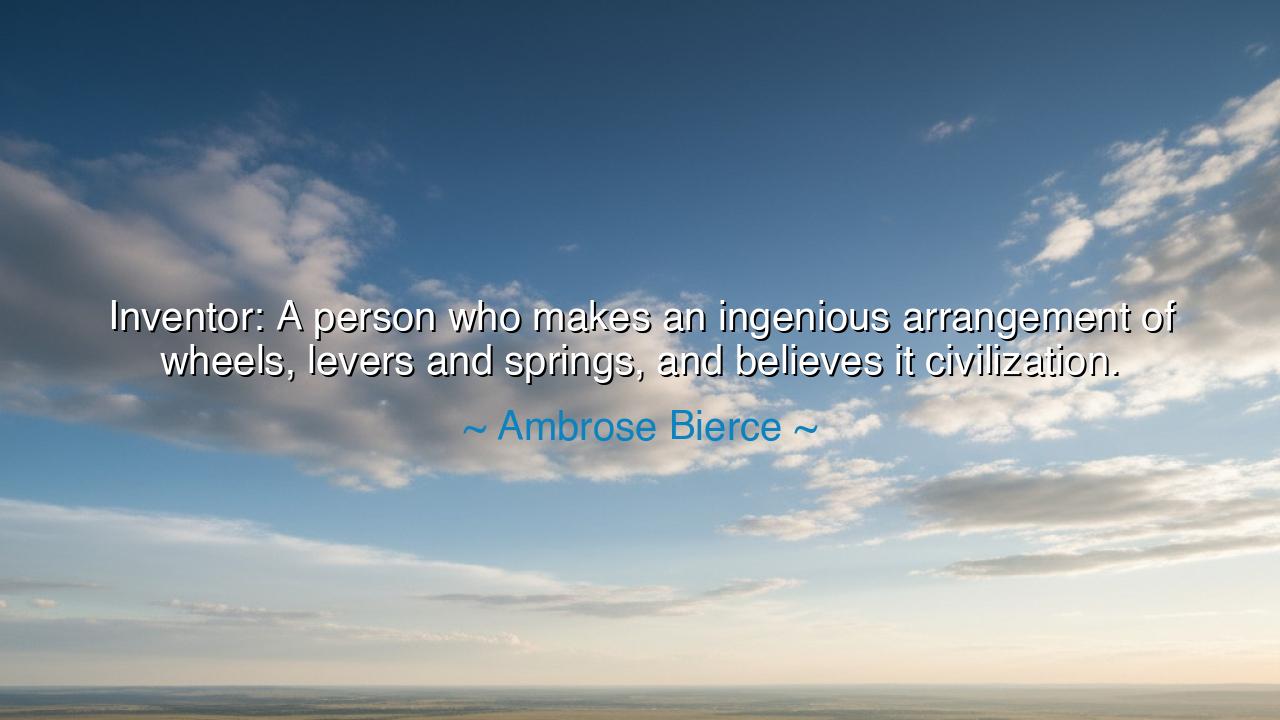
Inventor: A person who makes an ingenious arrangement of wheels
Inventor: A person who makes an ingenious arrangement of wheels, levers and springs, and believes it civilization.






When Ambrose Bierce, sharp-tongued satirist of men and their illusions, wrote, “Inventor: A person who makes an ingenious arrangement of wheels, levers and springs, and believes it civilization,” he was not simply mocking invention—he was piercing the heart of human pride. In his cynical wisdom, Bierce revealed a truth we often ignore: that the creation of clever machines is not the same as the creation of true civilization. One may assemble cogs and gears until they whirl with brilliance, yet still fall short of building a society worthy of the name.
For Bierce, the inventor is both admirable and laughable—a genius who bends matter to his will, but who sometimes confuses mechanical progress with moral progress. The wheel may roll smoothly, the lever may lift mountains, the spring may store hidden force—but none of these alone make men just, compassionate, or wise. Bierce’s words remind us that civilization is not measured by the ingenuity of its contraptions, but by the character of the people who wield them.
History gives us vivid illustrations of this tension. Consider the age of the Industrial Revolution. Inventors filled the cities with engines, looms, and locomotives. Steamships crossed oceans, factories produced goods beyond measure, and railroads stitched continents together. And yet, alongside this brilliance came child labor, poverty in crowded tenements, and skies blackened with smoke. The inventors believed their gears and pistons were civilization, but the deeper truth was that civilization lagged far behind their machines. Progress in steel outpaced progress in the soul.
Or think of the builders of the atomic bomb. The most ingenious minds of their age arranged their equations and devices until they unlocked the fire of the sun itself. They believed they had reached the pinnacle of knowledge. And yet, what they delivered was not civilization, but devastation. Cities were leveled, lives lost in an instant, and the world entered an age of fear. The invention was ingenious, but civilization is not found in the power to destroy—it is found in the wisdom to preserve.
Bierce’s satire thus carries a sting meant to awaken. It is not a condemnation of invention, but a warning against the arrogance that mistakes mechanism for meaning. The inventor who equates his machine with civilization deceives himself and others. For true civilization is not built of wheels and springs, but of justice, compassion, art, and the courage to rise above cruelty. The machine may serve these ends, but it cannot create them.
O children of the future, hear this teaching: respect the inventor, but do not worship him. Celebrate the marvels of his mind, but remember that a society’s worth is judged not by the cleverness of its tools, but by the dignity of its people. A nation that builds machines without building virtue is like a man who sharpens swords but never learns mercy—dangerous, powerful, and incomplete.
The lesson is clear: let invention be servant, not master. When you create, do so not only to dazzle the eye with levers and springs, but to uplift the heart, to ease suffering, to bring harmony where there is strife. Ask always: does this device serve humanity, or merely its vanity? Does it bring us closer to civilization, or merely clothe barbarism in shining steel?
Therefore, let Bierce’s sardonic wisdom guide your steps: genius is not civilization, and cleverness is not virtue. Build not only machines, but also meaning. Advance not only in power, but in purpose. In this way, your inventions will not be hollow wheels spinning in vain, but true pillars of civilization—a civilization that endures not by its machines, but by the greatness of its spirit.






AAdministratorAdministrator
Welcome, honored guests. Please leave a comment, we will respond soon